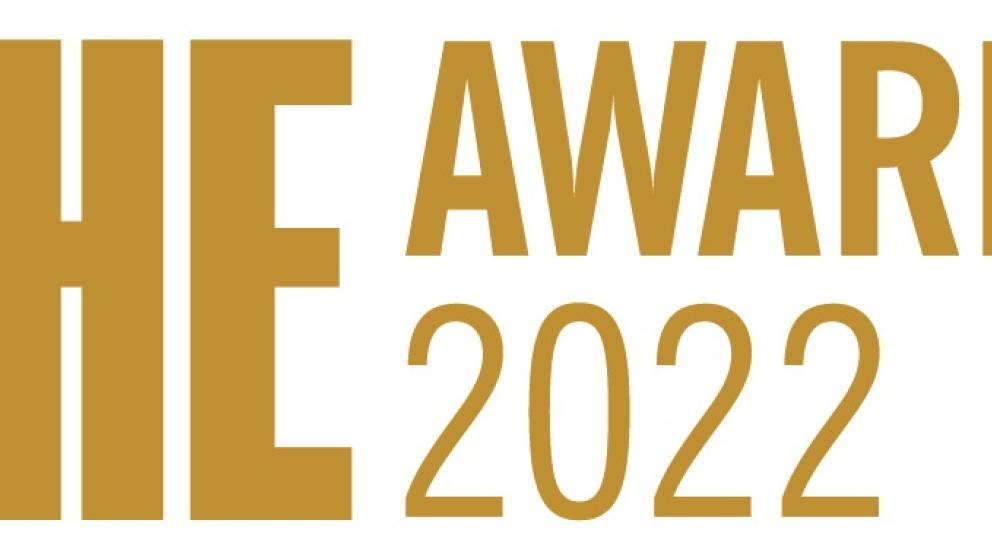Salford shortlisted for prestigious Times Higher Education Awards

We are delighted to announce that the University of Salford has been shortlisted for three awards across two categories in this year's Times Higher Education Awards (THE).
Widely regarded as the 'Oscars' of the higher education sector, the annual THE Awards celebrate the outstanding performance of colleges and universities across 20 categories, covering a wide range of university activity across leadership and management, administration, and academia.
2022 marks 18 years of the THE Awards and over 550 institutions, teams and individuals were nominated in total this year - a record number of submissions. These awards focus primarily on activity during the 2020/21 academic year.
Commenting on the shortlist, Professor Helen Marshall, Vice-Chancellor, said: "I am absolutely delighted that we have been shortlisted and recognised for our fantastic work. We don’t always take the time to stop and celebrate the dedication and hard work of colleagues and moments like this are a great opportunity to reflect on just how much we’ve achieved during recent challenging times. A huge well done to those nominated, and to all those who have directly and indirectly supported them in their work. I have huge pride in team Salford in all that we have accomplished.”
The winners will be announced at an in-person glittering awards ceremony in London on 17 November 2022.
As well as the three shortlisted entries detailed below, our Emeritus Professor, Peter Hogg, has been nominated for the prestigious THE Outstanding Achievement Award. There is no shortlist for this category, with the winner being announced at the ceremony.
The University of Salford has been shortlisted for three awards across two categories:
- Outstanding Estates Team
Crescent and University District Masterplan
The University of Salford’s dedicated Estates team have been instrumental in the development of our Crescent and University District Masterplan. Working in partnership with Salford City Council, the £2.5 billion Crescent Masterplan, a 240-acre major regeneration scheme, aims to drive economic and social prosperity for Salford over the 20-year life of the programme.
Throughout 2020-21, much of the team’s energy was focused on three campus developments, all opening in 2022, which are set to place Salford at the cutting-edge of science innovation. All of this work took place whilst still dealing with the impact of the pandemic, ensuring that the campus was safe and Covid-secure. The team have also transformed our environmental performance by embedding sustainable practice and social impact in everything we do.
- Research Project of the Year: Arts, Humanities and Social Sciences
IGNITION Living Lab at The University of Salford
Professor Hisham Elkadi, Principal Investigator and Director IGNITION NBS Living Lab
The University of Salford’s IGNITION Nature Based Solutions (NBS) Living investigates urban based solutions for real world deployment that will help fight the climate challenge that we face. The Lab is a live test facility that showcases viable and innovative green technologies in real time.
The project is a €4.6 million EU/UIA funded initiative that brings together 12 partners working to explore nature-based solutions (NBS) with principal aim of IGNITION being to uplift green infrastructure in Greater Manchester (GM).
The Lab showcases a variety of alternative designs for green walls, green roofs, rain gardens and sustainable drainage trees all of which have the potential to make a difference in protecting our towns and cities from the effects of climate change.
Evidence gathered from the Living Lab has shaped future projects and has led to the deployment of more than 40 nature-based solutions across Greater Manchester.
- Research Project of the Year: Arts, Humanities and Social Sciences
University of Salford, in collaboration with University of Kent, University of Leeds, London School of Economics and Political Science and Deakin University - Welfare at a (Social) Distance: Supporting the UK social security system during Covid-19 and beyond.
Professor Lisa Scullion
The social security benefits system was central to the UK Government's Covid-19 response, but experienced extraordinary pressure with over one million new Universal Credit claimants during the peak of the crisis.
To support social security policy and practice, Welfare at a (Social) Distance (W@SD) was developed. Funded by the Economic and Social Research Council as part of UK Research and Innovation’s rapid response to Covid-19, it represents the largest project in the UK focusing on the benefits system during the pandemic and its aftermath.
W@SD was instrumental in influencing benefits policy, practice and service through the Department for Work & Pensions (DWP). Given the significance of the dataset and speed at which data was shared, it informed the DWP of real-time impacts/experiences within the system and provided the key data source to the Universal Credit Analysis Division. Senior civil servants routinely commented that the research informed their thinking and decision making.
For all press office enquiries please email communications@salford.ac.uk.
Share:
